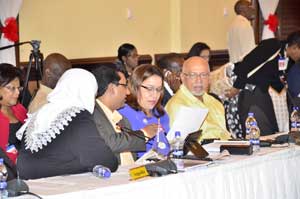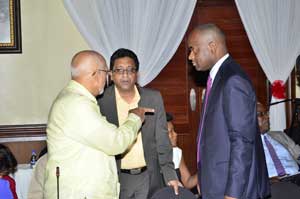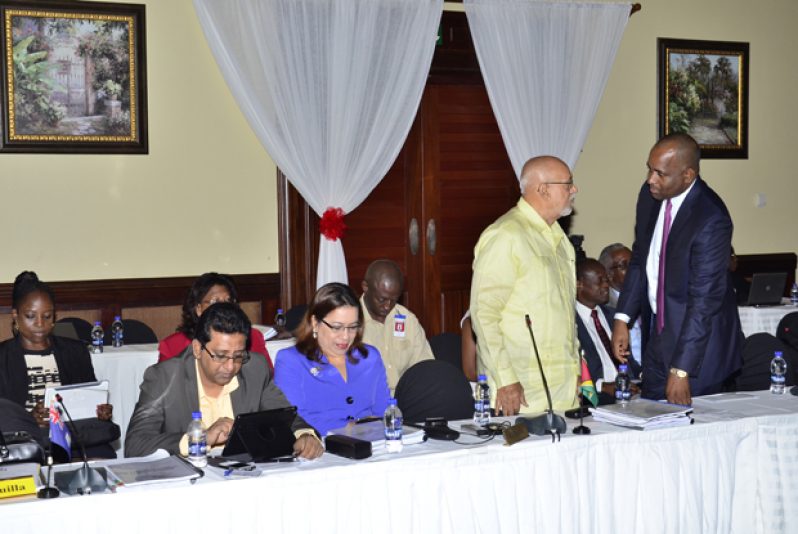WITH Tuesday’s formal opening of the 35th CARICOM Summit in Antigua behind them, the leaders of the 15-member regional economic integration would now be immersed in closed-door sessions to deal with a range of sensitive and challenging issues before the curtains come down tomorrow (Friday) on their four-day conference.

President Donald Ramotar, Attorney General Anil Nandlall and Foreign Affairs Minister Carolyn Rodrigues-Birkett at the 35th CARICOM Summit in Antigua

Foremost among such issues would be crime and security. And it seems quite safe to observe that no Head of Government, or Minister of National Security of the Caribbean Community would wish to be in the position of Trinidad and Tobago’s Prime Minister, Kamla Persad-Bissessar, when she addresses in a closed-door session, her colleagues on the depressing state of ‘crime and security’ in this region.
As the Community’s Head of Government with lead portfolio responsibility for matters pertaining to crime and security, Prime Minister Persad-Bissessar would have the unenviable task to present her assessment amid frightening rates of murders – including awesome gang-related assassinations and general criminality – at the domestic level.
There was a period when Jamaica – bearing the then unflattering media-created image as “murder capital” of the Caribbean – would have been most reluctant to catalogue its murder rates and gang-related gun-killings and robberies.
Currently, with Guyana in an also unenviable third spot among CARICOM’s crime-plagued states, Trinidad and Tobago bears the horrible burden of at least a murder a day, counting some 213 for the year by this past weekend with the shooting death on Sunday night of a 32-year-old soldier of the Defence Force, Lance Corporal Kayode Thomas.
Truth is, on a per capita basis, all 14 independent member states of CARICOM are being afflicted with hitherto unknown levels of gun-related-killings, armed robberies and other acts of criminality .
POLICE ASSOCIATION’S CONCERNS
The situation is troubling enough for the Association of Caribbean Commissioners of Police (ACCP) to make a spirited call at its annual general meeting in Port-of-Spain this past May to become “fully engaged” with the region’s governments and judiciary to, among other objectives, “expedite court appearances” by those charged with various crimes.
The ACCP has passionately argued that victims of crime as well as witnesses are suffering from the mounting backlog of cases and it needs to be borne in mind that both “are at the heart of the criminal justice system…”
Question of relevance at this time is whether there has been any specific initiative, either at the level of CARICOM’s Crime and Security mechanism – located in Port-of-Spain – or, at a national level between the Minister of National Security and Police Commissioner to reflect on the outcome of the ACCP’s May meeting?
It would also be useful to learn whether an information-based updated assessment of crime and security challenges has been prepared for discussion and action at the current Heads of Government Conference in Antigua?
After all, with the spectre of gangs-related assassinations and murders and other menacing acts of criminality reducing a few CARICOM states to so-called “killing fields”, where women, policemen and soldiers are among the victims, this is not viewed as a time for mere angry threats from either Ministers of National Security or the high command of the region’s Police Services.
Rather, the populace at large seem anxious for well-executed responses – nationally and regionally – to methodically combat the gun-killers and perpetrators of armed robberies and criminal violence.
OTHER IMPORTANT ISSUES
Apart from the burning issue of regional crime and security challenges, the current CARICOM summit would also be expected to come forward in its communiqué by tomorrow, with some precise information on the extent of progress made since last year’s 34th conference to make the Community less far off from achieving the much vaunted promises to transform the 41-year-old integration movement into the envisaged seamless regional economy (the CSME).
Additionally, there needs to be some new specific details that offer practical substance to the oft-expressed official commitment to hassle-free intra-regional movement by citizens of the Community. This, moreso, against the backdrop of the 2013 historic ruling by the Caribbean Court of Justice (CCJ) in the case of the Jamaican national Shanique Myrie vs. Barbados Government.
Foreign policy issues would, of necessity, require some clarity in CARICOM-USA relations in view of frequent allusions to unnecessary interferences from Washington and, relatedly, the repeated call for a long sought request by Community leaders for a summit meeting in Washington with President Barack Obama.
Therefore, the 35th Summit communiqué would be anxiously awaited.
Analysis by Rickey Singh



.jpg)










